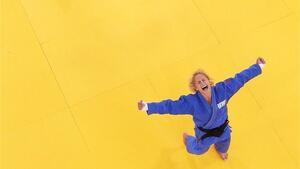Grappling all the way to the Olympics
For the first time in world history, this year every country competing in the Olympics has a female athlete on its team. This historic moment was made possible when Saudi Arabia, Brunei, and Qatar permitted women to be included in their delegations. Although the Saudi clergy believes that exercising is contrary to a woman’s natural role, two weeks ago they caved to pressure from human rights groups and broke with tradition allowing Sarah Attar to compete in the 800 meter run and Wojdan Ali Seraj Abdulrahim Shaherkani in Judo.
And whom does Wojdan Ali Seraj Abdulrahim Shaherkani have to thank for this opportunity? A Semitic sister named Rena Kanokogi.
Rena or “Rusty” Kanokogi (born Rena Glickman) known as “the mother of women’s Judo,” worked tirelessly for the sport to become part of the Olympics. In 1988 she finally saw her efforts realized when the International Olympic Committee voted to include Judo in the games, and she went to Seoul as coach of the first U.S. women’s team. The achievement came only after a long struggle. Rusty was a fighter in several senses of the word; her journey is worthy of a Hollywood movie.
Her story begins on the streets of Coney Island in the early 1940s; she was a tough Jewish kid who found a sense of belonging among the island outsiders: freaks, hustlers, and barkers. Ignored by her parents, she followed her own ethical compass. Knuckle scarred and with her brother’s bayonet strapped to her leg, she led a girl street gang called the Apaches, defending the underdog, fighting for justice because as she would say, “Injustice drives me nuts.”
Flash forward to 1955. That’s right: 1955. At a time when most women were home wringing the laundry, Rusty was about to starting wringing opponents. One night while taking a break at the YMCA, a smaller man threw her to the ground in a classic Judo move. “I love that! How’d you do that?” Smitten with the sport, she began her training. While women weren’t officially barred from competition, she sheared her hair and taped down her chest to compete in the 1959 YMCA national championships. She won her bout (against a man, of course), but when the tournament organizer asked her if she were a woman, and she nodded, he stripped the seventh-degree black belt of her medal.
Having lost none of the scrappy seven year old’s spirit, Rusty persevered. In 1962 she was invited to Kokodan, the Judo mecca in Tokyo, where she performed so well against her female opponents that the masters invited her to train in the main dojo, making her the first woman to grapple with the men. There she met her future husband, Ryohei.
The couple moved to the U.S. where they raised two children and established Judo training centers throughout Brooklyn. She wracked up a string of victories—and of injuries. She explained that her male opponents, threatened by the possibility of losing to a woman, would try to throw her “through the cellar.” Beginning in the 1970s, she focused most of her energies on teaching and advocacy.
Rusty spent her nights raising money, writing letters, and lobbying. In a February 2009 interview Rusty said, “That’s all I talked about. I was totally crazy. You said, ‘Hello, Rusty,’ and you had three hours of Judo conversation on your hands.” Referring to the 1959 YMCA competition where she was asked if she were a woman, Rusty reveals, “Had I said no, I don’t think women’s Judo would have been in the Olympics. It instilled a feeling in me that no woman should have to go through this again.”
And since 1988, women haven’t.
Now, though, other issues have surfaced.
For safety reasons the International Judo Federation bans fighting with headgear, including a hijab, the traditional Muslim headscarf. As described in a comprehensive Judo manual, fighters can legally attempt to choke their opponents by using “hands, arms, or legs on the opponent's collar or lapels to apply pressure to [the] neck or throat"; however, strangulation, by any other means even accidentally, for example with a hijab, is off limits. The president of the IJF says that the Saudi competitor must comply with “the principle and spirit of Judo.” Shaherkani’s father says that his daughter "will not compete in the Judo Games on August 3 if the committee insists that she removes her hijab.”
Rusty died in November 2009. If she were still with us, I wonder what she’d say about the hijab dispute.
Where do you come down on the issue? Should Muslim women be allowed to wear their hijabs when grappling? What if this were a Modern Orthodox woman who chooses to wear a wig or headscarf?
For a tribute to Rusty Kanokogi, go to the “We Remember” feature on jwa.org.
To read more about Jewish women Olympic trailblazers, check out:
“World’s best girl athlete,” Fanny “Bobbie” Rosenfeld
Record-breaking discus-thrower Lillian Copeland
Five-time Olympic athlete Dara Torres
For an overview, see “Jewish Women in the Olympics”
P.S.: Judo competitor Marti Malloy earned a bronze medal for the U.S. today when she threw 2008 Olympic champion, Italy’s Giulia Quintavalle, to the mat after only 2 minutes 34 seconds had elapsed in their five-minute match. "I peaked for this tournament," said Malloy after the Monday victory. "It's my first Olympics, and I feel fantastic to be leaving with the bronze." Thank you, Rusty, for making this possible.









Nice article.